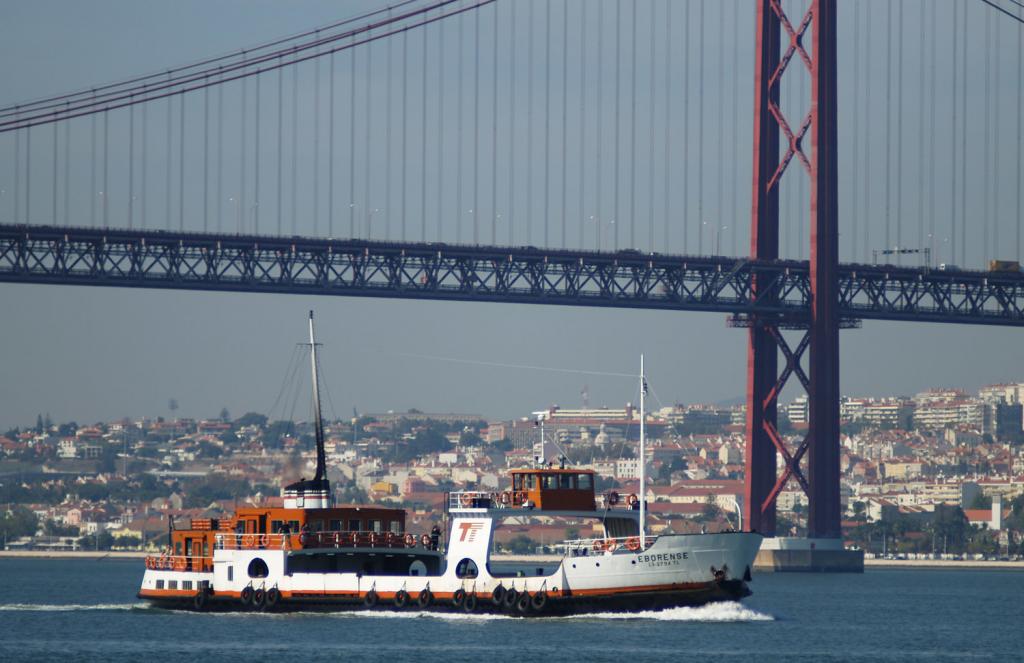Thessaloniki gets ready for its metro launch in November
The underground rapid transit lines have been under construction for almost two decades due to various project delays
 TheMayor.EU logo
TheMayor.EU logo 
TransTejo will start replacing its older ferries this year, Source: Gerard Gerbes Birges, on Flickr (CC BY-NC-ND 2.0)
The fleet renewal plan will start with 10 electric ships
On Friday, 18 March, the Portuguese Government announced an expenditure approval plan which concerns the renewal of the Transtejo ferry company fleet. The latter is the company that operates services on both banks of the Tagus River in the vicinity of Lisbon.
The renewable in more concrete terms means the acquisition of 10 electric ships as part of the plan to make the ferry services more sustainable and in line with the contemporary standards.
The first of the new vessels, built by the Spanish shipyard GONDAN, will be delivered this year.
“With these ships, which represent an investment of 52,440,000 euros, the company will have an environmentally sustainable fleet of ships. It will be powered by a 100% electric propulsion system, with lower energy consumption than current ships and no GHG emissions (in 2019, diesel consumption was around 5.249 million litres, corresponding to the emission of 13,122 tons of CO2), in line with the policies for decarbonisation,” explained a statement from Transtejo, as quoted by The Portugal News.
Transtejo provides river connections to Lisbon from Seixal, Montijo, Cacilhas and Trafaria/Porto Brandão. It is an essential and important service for residents of the municipalities lying on both banks of the estuary of the Iberian river.
The 40-meter-long ferries are designed based on a catamaran-type hull form specifically optimized to make the most of the almost 2MWh of electrical energy stored in its batteries, with silent operation and no CO2 emissions.
With a capacity of around 540 passengers, they are expected to transport some 19 million people each year across the Tagus River.
The charging system will be centrally located on the vessels, allowing charging on both sides from towers located on the terminal’s floating pontoons. The vessels’ energy storage systems (ESS) are designed for a complete round trip on the longest planned route (using between 20-90% of maximum capacity). In the daytime, the vessels will use fast charging (3-4 MW), while slow charging (0.15-0.2 MW) will be used during the night.

The underground rapid transit lines have been under construction for almost two decades due to various project delays

Now you can get your wine in Talence by paying directly in Bitcoin

That’s because the state has to spend money on updating the railway infrastructure rather than subsidizing the cost of the popular pass

Rethinking renewable energy sources for the urban landscape

The examples, compiled by Beyond Fossil Fuels, can inform and inspire communities and entrepreneurs that still feel trepidation at the prospect of energy transition

Now you can get your wine in Talence by paying directly in Bitcoin

The 10th European Conference on Sustainable Cities and Towns (ESCT) sets the stage for stronger cooperation between the EU, national and local level to fast track Europe's transition to climate neutrality.

At least, that’s the promise made by the mayor of Paris, Anne Hidalgo

The underground rapid transit lines have been under construction for almost two decades due to various project delays

At least, that’s the promise made by the mayor of Paris, Anne Hidalgo

Hostal de Pinós is located in the geographical centre of the autonomous region

Despite its church-y name, the district has long been known as the hangout spot for the artsy crowds

Urban dwellers across the EU are having a say in making their surroundings friendlier to people and the environment.

Forests in the EU can help green the European construction industry and bolster a continent-wide push for architectural improvements.

Apply by 10 November and do your part for the transformation of European public spaces

An interview with the Mayor of a Polish city that seeks to reinvent itself

An interview with the newly elected ICLEI President and Mayor of Malmö

A conversation with the Mayor of Lisbon about the spirit and dimensions of innovation present in the Portuguese capital














